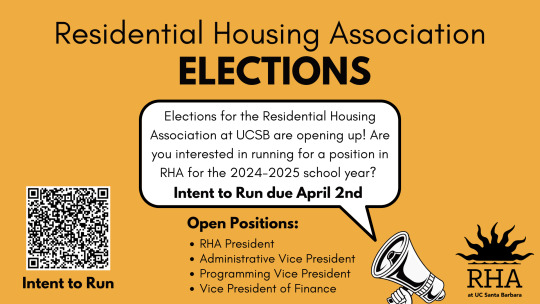#residential housing association
Photo

Midcentury Exterior
An illustration of a small, one-story, mid-century modern blue stucco house with a black roof and shingle roof.
#blue house with white trim#residential addition#nari#stucco#national association of the remodeling industry#modern craftsman style#coty
0 notes
Text

#“The house you looked at today and wanted to think about until tomorrow may be the same house someone looked at yesterday and will buy today#–Koki Adasi#Koki & Associates#Inc.#United Estates LLC Dubai !!#ENQUIRE NOW to discuss your requirements for Dubai Real Estates / Property Investment Plans#please contact us:#☎ +971 52 955 2423#☎ +971-4 2500089#✉ [email protected]#🌐www.unitedestates.com#unitedestates#unitedproperties#propertymanagement#rentals#sales#building#residential#commercial#property#investment#invest#investinrealestate#quotes#sayings#investors#dubaipropertiesinvest#realestate#dubai#uae
1 note
·
View note
Text
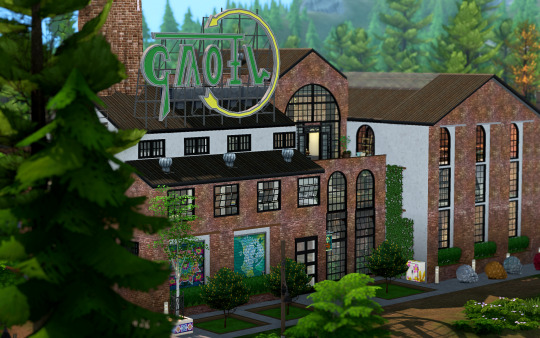




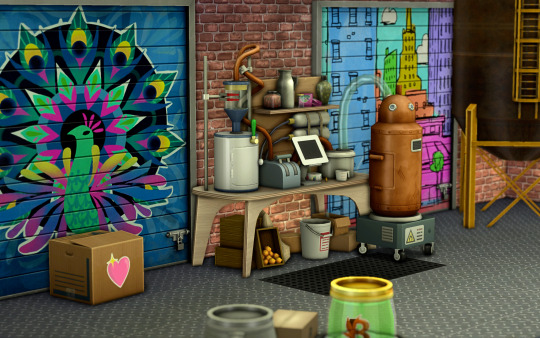
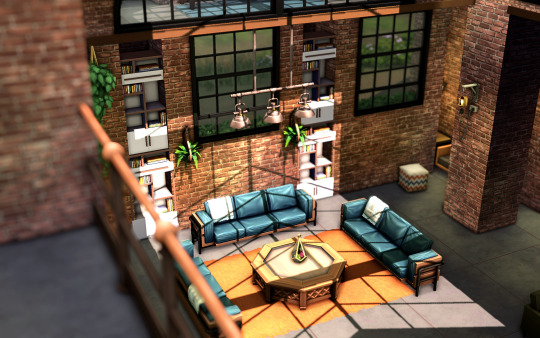
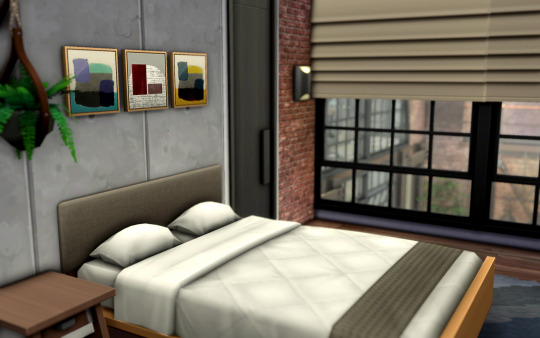



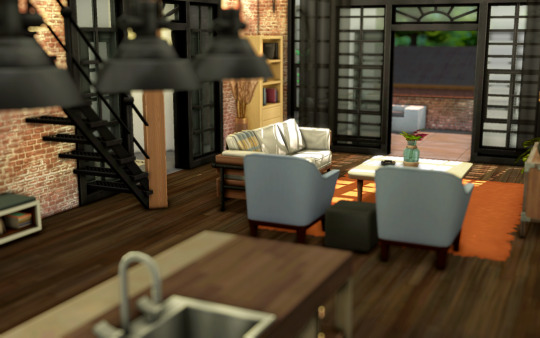

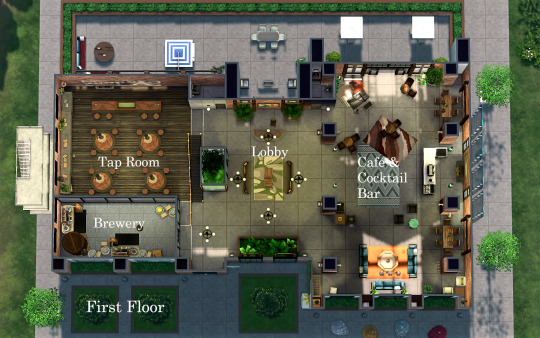
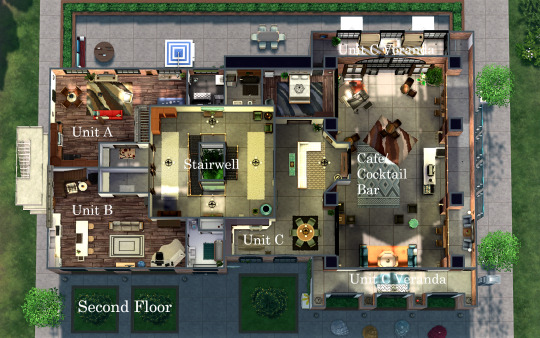
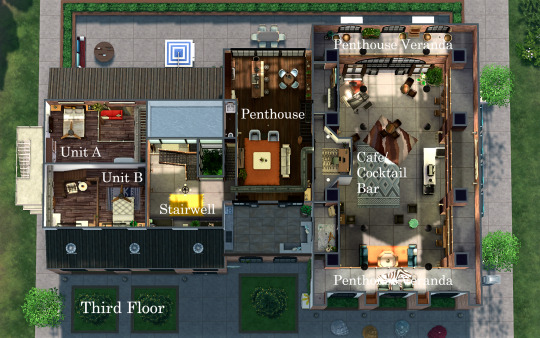

🏭 Rosenberg’s 🏭
The crown jewel and most recent addition to Mistretta and Associates’ property roster is Rosenberg’s, a top to bottom refurbishment of an 1890s lumber mill overseen by Giorgio Mistretta himself.
The ground floor is home to a microbrewery and tap room, as well as a café that transitions into a music venue and cocktail bar at night. Above are three apartments, complete with the original duct work and factory windows that make each one unique. Crowning it all is a penthouse loft, currently inhabited by Giorgio himself as he oversees the opening of the building, as well as a rooftop pool, exclusive to the building’s wealthy residents and their guests.
Lot Type: Residential, Café, or Bar
Lot Size: 40x30
Lot Value: 299,237
House Size: 4 Bedrooms, 6 Bathroom
CC-free
Available to download on my gallery page as Rosenberg’s Factory Refurb or here (SFS, no ads; includes some minor updates to the gallery version). Based on James Turner’s original factory shell.
#ts4#ts4 build#ts4 cc free#sims 4#sims 4 build#the sims 4#the sims 4 build#ts4 download#ts4 build download#sims 4 build download#Moonwood mill#Moonwood mill build#in an alternate darlington universe: yeehaw edition#in an alternate darlington universe: the yeehaw transition
172 notes
·
View notes
Text
the bedroom hymns ● chapter xi

⟶ Chapter summary | Never before would you ever look at yourself as a damsel in need of a rescue. But when a handsome stranger comes to help you escape a possible danger, you make no effort to deny his helping hand. As you continue your stroll through the market town with your hero by your side, things between you begin to unravel, leaving you to question whether or not he is truly a stranger at all.

⟶ Title | The Bedroom Hymns: a Bluebeard’s twist
⟶ Pairings | Min Yoongi x female reader
⟶ Genre | Fairy Prince!Yoongi, Crown Princess!reader, Fantasy au, Fairy Tale retelling au
⟶ Word count | 7,060 words
⟶ Ratings | PG-13, +18 / M for Mature for future chapters

⟶ Story Masterlist | ⤎ previous chapter | next chapter ⇢
⟶ Main Masterlist | Mailbox | Taglist | Feedback | Music Playlist | Ko-fi

chapter xi. wanderers-2


The market town of Narlès has turned out to be quite an intriguing place for you to visit.
The astonishment that you felt upon your first arrival may have stemmed from the joy your felt from finally traveling away from Smotia, and being able to experience a new place that seems to be a complete opposite to the homeland that you have known your entire life.
Despite the fact that the Land of Smotia and this market town are separated merely by the rough terrain of Mount Orrum as their main border, what you see here makes you feel as if you have arrived at an entirely different world.
The green hills of Narlès where the town’s main residential area is built—with rows and rows of magnificent houses and mansions lining up the foot of the hills—seem to be the most fertile area of the town, compared to the rest of the town.
The town’s harbour where ships would berth for days is filled with the scent of sea and hot breeze that feels dry on the skin. Yet it does nothing to dissuade the busy merchants and their men who are there to trade imported goods with the locals. And then there is the true heart of Narlès, the marketplace that has been bustling since early dawn and would not quiet down until late at night, where the air around you feels stale and arid, with fine dust from the dry ground king airborne under the feet of the busy crowd.
Every part of the market town that you have seen so far seems so new and riveting to your eyes that you just want to take your time to relish the moment and observe closely.
The more you learn, the more you can admit that compared to your previous excursions, this may be the first trip that feels more insightful. Not only for learning firsthand about the foreign land and experiencing a different kind of freedom, but also for learning a bit more about your father.
Through your expeditions through the portals, you have learned a small part about his magic.
But it wasn’t until today, when you came upon this place and got to follow your father’s traces that had been left behind, that you began to understand the merit of his magic and how he was making use of it to help him rule the empire as the King.
As the center point of business tradings between kingdoms, Narlès may have been the place where your father has been running most of the empire’s business dealings which involve obtaining rare goods from other nations or kingdoms that Nythelean Empire has never officially associated or formed an alliance with.
You first learned about the market town and your father’s activities here by browsing through the merchant’s house to find clues before leaving the place. Upon noticing the foreign atmosphere which led you to believe that the where you had ended up in might no longer be a part of Smotia, you knew that you would need to have some insight about where you were before going further with your expedition.
At first glance, the merchant’s house may seem comfortable enough for someone to live in. But it didn’t take long for you to realise that the house had been nothing more but a secret transit for your father during his visits.
The first giveaway was his disguises, the ones that had been no doubt something that the King would use to impersonate a local merchant or a Baron to blend in with the locals. Then you went to find the study desk which provided you with more information—the paperworks and notes from your father’s business trades, all signed under a different name, and his personal ledger that contained everything you needed to know about the business deals that he made and the people that may come in contact during his work visits.
His ledger became your guide as you went to find the town’s harbour. As someone who had never seen the sight of sea before coming to Flagon, watching the large ships at the harbour put you in complete awe. You marvelled at their massive sails that are flowing with the ocean breeze, and also at the men who were working to bring delivered goods to and fro the large ships without rest.
You pictured your father in a local merchant’s place that you watched working at the docks. His thick, greying hair and his neatly-trimmed beard hidden under the fake curly wig and bushy beard while he came in to gather all the goods to send back to Smotia, while the men around him remained oblivious that they were dealing with the ruler of the neighbouring empire.
And that image was enough to put a smile on your face, when you saw him not as the usual stoic and cold ruler of the empire and just a merchant who would be barking out commands while joking here and there with his workers—just like the old merchant who greeted you at the harbour when you walked past by.
It was the image of your father in his disguise while blending in with the people that went through your head as you weaved through the marketplace. The bustling crowd, the shops and stalls and the captivating goods that they were offering, and the lively atmosphere completely entranced you that they all made you forget the reason why you were there in the first place.
Instead of following your father’s shadows, you were beginning to forget who you were, as if you were simply one of the common folks browsing through the market in search for a souvenir of a trinket to bring home with.
His presence was what finally snapped you back to present. Him. Your mysterious shadow who is now guiding you to weave through the dark alleyways to escape a possible danger. Something that you had been foolishly unaware of coming your way until he managed to come find you first.
With Yoongi, not only are you made to feel safe in his company, he also helps you continue to pretend to be someone else. Suddenly, you are no different than a stranger that he met while strolling through the market, a simple girl who was enjoying her moment of freedom and was in need of a rescue, instead of someone with the crown waiting for her back home.
It feels fleeting, as if you have become a rue dove that is free to flap her wings and fly without a care. Helping you forget all the things that have been weighing you down as you are haunted by the plaguing questions regarding your forgotten past.
The journey through the dark alleys continues as if there is no end. But Yoongi’s presence alleviates all of your worries. In fact, he continues to make you feel comfortable being close to him, which shouldn’t make sense at all, as he is nothing but a stranger that you have only met today.
Yet the familiar feeling that you feel sensing from him continues to grow stronger, even if your memory seems foggy each time you try to remember where you might have seen him before. Your eyes fall on your entwined hands, as Yoongi has yet to release you ever since he brought you through this escape route.
The longer you remain to be this close with your new companion, the more you feel an invisible force pulling you closer to him. You have no idea what this means, or if you should grow wary about it, as the more you try to fight it, the more you find it hard to breathe. The darkness around you becomes the least of your worries as you begin to wonder if Yoongi has somehow put a spell on you, something that you should have thought possible to happen now that you have proven that magic truly exists.
Your fight against your own mind as it drifts into the dark side of wonders, until Yoongi suddenly gives you a gentle pull to snap you out of your thoughts and whispers, “Here we are.”
You breathe a sigh of relief as you come out of the darkness and get to meet the golden sunlight once again. And what you see around you is enough to draw an astounded gasp right out of your lips.
Emerging from the dark alleys almost makes you feel as if you have been walking through a different portal, sending you to a different world that shows no sign of similarity to the hectic marketplace that you left far behind you.
“Come, let’s go this way,” Yoongi speaks for the first time after a long period of silence as he guides you to follow the path in front you, taking you away from the dark alleyway and allowing you to observe your new surrounding more properly.
The streets here are much cleaner, more narrow in width, all covered in cobblestones instead of dirt and gravel. You see bigger shops on either side of the street and stalls selling luxury souvenirs made with high-quality materials that you would often see noblemen and women wear.
Looking around, it is quite obvious to you that you have found your way into the more fancy and exclusive part of the market town.
There are shops here that offer elegant gowns and dashing suits, while others offer leather-made goods, such as ladies’ heels, boots, and fancy handbags. You also get to see stores selling out pieces of jewellery, fancy accessories, and even decorations made of gold and silver plates that you can see through the display windows as you walk past.
Between the busy shoppers, you get to occasionally see Lords and Barons roaming the streets and looking closely at the items shown on the display, as if they are here to find gifts to take home for their wives and children, while ladies in wait walk in and out of the shops with their guardians in preparations of their debutante.
Yoongi gently pulls you closer just as you are getting so entranced by the sights around you that you fall a step behind. You look up, unable to stop yourself from smiling when you get to see his face from up close.
“I’m pretty sure we’ve gotten far enough to lose those thugs back there, don’t you think?” you question him while pointing out that it may no longer be necessary for him to protect you this intensely.
Yet Yoongi merely responds to you with a grin. “Just wanted to make sure that I’m doing my duty properly,” he says in response to your comment. Clearing his throat, he slowly releases his tight hold on your hand, before subtly moving his hand to the small of your back to guide you with a light touch that to make it seem like he isn’t being overly intrusive as he continues guarding you.
“You don’t seem to feel uncomfortable travelling through the back alleys. Have you done something like this before?” he suddenly asks you. He sounds genuinely curious, which you cannot help but respond with a nervous laugh.
“I suppose you can say that,” you try to answer him without giving away too much about your secrets.
“I’ve been travelling quite often as of late, as you may have noticed already—” you say this with a mocking tone of voice which draws a smile to his face, “and not many of those places are safe for a lone traveller like myself to roam about.” You let out a deep sigh. “Let’s just say there have been times when I had to slip through dark alleyways to escape situations that made me feel uneasy or to merely avoid being swept in the crowd. Sometimes I’d also slip into quiet places just to have some peace and quiet.”
As you are saying this, the thrilling nights that you spent lurking in the shadows back home in Smotia return to you. Reminding you of those moments when you had to slip through one dark alleyway to another to be able to enjoy the town without being caught or having people noticing you, and recalling your wish to be able to blend with the townspeople without having to race against time to return home.
Compared to the unpleasant experiences you met while slipping into the back alleys in the slum area of the business district, your current great escape seems like a breeze. Especially when you have a cloaked gentleman walking with you, keeping you safe with his hand remaining at the small of your back, sometimes pressing down harder when he needs to give you a silent warning moments before you are about to collide against another pedestrian.
When you turn to look at him again, Yoongi has his eyebrows furrowed. Looking concerned after hearing your answer. “Have you been searching for something?” he gently asks you again as you both slow down your pace between the shops, giving you the chance to do some more sightseeing.
For a brief moment, you have your rapt attention on the shops around you, causing you to almost misread his question. “I’m sorry. Are you asking if I’m looking for something to buy here?”
Yoongi shakes his head a little and smiles. “No, that’s not what I was asking,” he says. “It’s just that you said so yourself, that you’ve been going to different places lately. May I ask why? Is it because you simply enjoy travelling and finding new places, or do you have something that you are looking for?”
“Oh,” you softly laugh. “It’s nothing like that. Not particularly.”
You stop for a moment, taking the time to think deeper about your purpose. Because the truth is, you really do have something that you have been searching for.
At first, you started going through the magic portals in search for answers. After being haunted by all the dark rumours surrounding your father over the years, you were in desperate need to figure out what kind of secrets that your father might have had, determined to find proof that he isn’t as wicked as his own people made it seem with all the tales that have been established around the stories of his past.
Once you were introduced to the secret magic that he once said as a part of your family’s legacy, you kept using it to learn more about the family that you know almost nothing about. Perhaps you also had some hope to feel some kind of a bond with your father, as the King has always been so busy with the matters around the empire that he rarely spends time with you outside of the royal events and the short period of time you share whenever he summons you to see him.
Then, you found a new purpose for your excursions as you wished to find a way back to the summer palace. A wish that the magic portals has yet to grant you with no matter how often you tried.
But is there any other reason why you have continued with your secret trips through the portals? Do you really have other things that you are still searching for?
And how are you supposed to share all of this with a complete stranger, without revealing your true identity?
“Let’s just say that I may have some undying hunger for adventure. It gives me a little sense of freedom whenever I am in a place where nobody knows who I am,” you find yourself sharing this once you realise what your soul has truly been searching for. When the freedom you currently feel seems to make you feel more alive than ever, to finally be able to experience what you have been seeking each time you slipping outside of The Citadel at night.
“I think, in a way, I’ve been searching for my own identity. I wanted to understand a bit more about myself that I couldn’t possibly learn just by sitting idly and waiting for the answer to come to me,” you continue, “does that make sense?”
Yoongi surprises you when he nods and says, “It does, and I actually know exactly what you mean.”
“Do you?” you ask him, only to receive no answer as he keeps his eyes on the street ahead, completely focused on his task to guide you through the busy part of the street where there are visiting nobles going in and out of the stores around you. Feeling uneasy with the silence between you and wanting to know more about him, you gently nudge against his side and question him, “How about you?”
This draws his attention back to you. “What about me?”
“You’ve been travelling too.” You shrug. “Coincidentally, you have also been there in some of the places I’ve been to.” You stop for a moment, before wondering out loud, “How was that even possible?”
“Perhaps the Fates wanted us to meet each other?” he teases you with a sly grin on his face. “As for travelling—” he looks away briefly, “as a mercenary, I do have to travel a lot for work. Lords, Barons, and rich merchants often hire me and anyone from the brotherhood to either guard them during their travels or to protect the goods that they must deliver for business.”
As you take all of this new information in, you recall sensing his presence back at the royal winery and feeling the need to question him, “And what about that day at the royal orchard house?” You turn to look at him. “Had that been another one of your work duties?”
As Yoongi returns your gaze, there is a look in his eyes that is hard for you to make out of. But the look disappears when he gives you a small smile.
“If I must recall, I was hired by Baron Gawin, the nobleman living in the Southern district of Smotia who is also a regular customer of the royal winery. Thanks to the deal we made, I am required to make regular visits to the royal winery. Be it to accompany the Baron or to visit the orchard house by myself under Baron’s orders to supervise the wine delivery for House Gawin,” he easily explains. “And what were you doing at the royal orchard house the day I saw you?”
Unprepared for him to return your question with his own, you are taken aback and left speechless. You feel a sudden guilt for bringing up the day at the royal winery which may risk revealing too much as a result.
Which may include revealing your identity.
Because how are you supposed to explain appearing at a royal property when you were supposed to be a lone traveller, someone who was merely passing through, and not anyone who is related to the royals or a part of the nobles who would easily have access to the royal property as they please?
“I was merely sightseeing,” you finally answer him while desperately hoping that he wouldn’t be able to see right through your lies. The lies that keep flowing right out of your mouth the moment they are unleashed.
“I had been staying in Smotia for a while at the time and found my way to the orchard house. I had no idea at first that it was a private property of the royal family. I was half expecting to be caught by the royal guards,” you softly laugh. “But when nobody seemed to notice me, I simply took the chance that I was given to take a look around. I figured that it would be a waste of a trip if I didn’t get to see all the interesting places I could find during my travels, although I tried to keep away from the workers while avoiding the guards, and quickly left after I had enough of a good time so I wouldn’t be interrupting their work. It’s still sad that I didn’t get to taste the wine while I was there, though.”
Yoongi says nothing as he listens to your excuses. Though the small, cryptic smile that he is wearing on his face and his lack of response makes you feel quite doubtful. You are just wondering what might be going inside his mind when he nods to himself and says to you, “Ah, I see. So that’s how you got there.”
He turns to look at you with a gentle smile. “I’m glad you didn’t get into trouble that day.”
You respond to him with a wary smile. “Would you have rescued me and also be my hero if I had gotten caught that day?”
“Hmm—” he hums, acting as if he is genuinely considering his options. “I’m not sure. Those were royal guards watching over the property, after all. They are the last people I would want to get in trouble with.”
You feign a gasp. “So you would’ve just ignored me and let them catch me?”
Yoongi laughs at your reaction. “I might be a man of a hired service that doesn’t work under the sovereign law, but if I want to protect myself and make sure not to lose my job, I’d still choose to follow the rules,” he says with a hint of mirth in his eyes.
“I mean, facing thugs is one thing, and you are really pretty”—he winks, making you flush in the cheeks with his compliment—”but I don’t think it would be enough to risk losing my neck by challenging the royal guards for you.”
You laugh at this. “I’m offended. But well played, Sir.”
The topic of your previous encounters and why you have been going to all the different places in Smotia is pushed aside as you continue walking through the streets of the upper side of Narlès. It gives you a bit of a reprieve the moment Yoongi seems to lose interest and is no longer trying to pry about your identity and where you came from, as you have no idea what kind of lies that you must give him to protect yourself if he continues.
Instead, Yoongi fills the moment by answering your questions about the town and sharing everything that he has learned so far—from its history and its livelihood, to the all kinds of people and communities that would often come here to do their business or to just simply pay a visit for leisure.
He also shares various stories that he has heard or encountered during the times he came to visit this place, including all the intriguing ones that you could have never experienced all through your sheltered life.
“Narlès isn’t governed by any reigning kingdom, but by its own people. The local townsfolk and the ring of merchants that are in charge of running the business trades here,” he explains to you while he joins you in taking shelter in one of the stores, finding the chance to have a short break while giving you the chance to admire the various accessories that they have on their display which seem to have been brought in from foreign lands.
“So any representatives and merchants from the neighbouring kingdoms or any surrounding nations that come in to trade goods would have to put aside their animosity should they ever encounter any of their adversaries or rivals to keep the peace,” Yoongi continues. “The rules are mainly placed to keep all the business activities within the territory of Narlès in order and to keep everyone here safe. Even if these kingdoms are at war out there, they are forbidden to bring that fight here.”
“A neutral land where your origin matters only to yourself,” you mutter as it starts to dawn on you the reason why your father had exclusively connected this place to the home castle by using his magic portal.
As the ruler of a budding empire that is currently caught in the middle of a conflict, making sure that he would remain undetected during his visits to this place would only make sense. The heavy terrain between Smotia and Narlès would have also been a challenge for your father to travel back and forth between his busy schedule.
That is, if he had always been in Smotia during all of those times at all.
One of the things that you have been suspecting from your father’s work activities is his strong connection to the home castle. Ever since you started to learn more about the existence of the portals in the home castle, you have been wondering if this had been His Majesty’s ways to be able to travel out of the palace so easily, completely undetected and untraceable, even if it includes travelling to The Citadel from his royal study back at the home palace.
Though you may not know the true answers until the day your father returns home and you will get the chance to ask him directly.
For now, you try to focus on the present, as you indulge in the moment of luxury as the shop attendant helps you with various accessories made of gold which are also embellished with your favourite gemstone—ruby stone—to try on.
Once you have enough of the experience, you leave the store with a heart full of joy to continue your sightseeing and window shopping. You have no answer when Yoongi inquires you about leaving without buying a souvenir for you to bring home with, but he makes no complaints and seems to be enjoying himself even as he acts as your personal guard.
As you walk beside him while enjoying his company, you recall the previous conversation you had with him about the reason why he has always been moving from one place to the other that has allowed you to keep crossing paths.
“Were you not also on the job today? Was that the reason why you were at the marketplace today? Am I taking you away from your duties by having you as my personal escort?”
A smile grows on his face, as if he has been expecting you to question why he remains by your side after your glorious escape. The danger has long gone, and he has helped you get to safety. While you don’t mind his company, you would hate to think that you have made him leave his obligation behind because of your recklessness.
“You were quite lucky that we came across while I was not on duty. So you shouldn’t worry about any angry employer interrupting our relaxing stroll,” he simply says.
The way he speaks sure sounds convincing. Yet for some odd reason, there is something about the way he explains himself which tells you that he isn’t telling you everything. You can also see it in his eyes, when the look that he is giving you seems to be telling you that there is a secret that he is keeping from you.
But you decide not to pry any further.
Not when you barely know him, even if his presence seems to fill the hollowness inside you that you may have overlooked for quite some time. And certainly not when you also have your own secrets to keep.
Yet your deepest wish is to savour this moment without feeling doubtful. To be able to enjoy this excursion with a companion who makes the insides of your chest flutter with his little gestures and his deep, calming voice.
“That’s good to hear. I’d hate to know that I’m giving you trouble for saving me and keeping me company when you’re supposed to be on the job,” is what you simply say to him. “I do have to say that I am worried that I might have to pay for your service. Not only did you save my life, now you’re showing me around to make sure I don’t get lost. I know I’m going to feel like I owe you a lot.”
Yoongi laughs. “I am being quite generous today, so I’ll give this service as a favour. Take it as an introduction gift.”
“Ooh, why thank you, my kind Sir. I feel honoured,” you tease him with a curtsy, before surprising him by slipping your hand around his arm. Although you are quite surprised yourself when it feels as if a natural thing for you to do this with him.
“Then, let’s continue our little date now, shall we?” you continue to tease him, and you are pleased when you get to see a part of his cheeks turning crimson while he tries—and fails—to hide his bashful smile.

As the rows of the luxury stores come to an end—also putting an end to your window shopping and your impromptu shopping spree as you managed to buy a couple of trinkets as a memento—you are met with a different kind of atmosphere as the street opens up to new scene.
Around you, various quaint dining lounges, pubs, and bakery shops start to replace the glimmering stores. Instead of displays of gowns, leather goods, and jewelries, you begin to see displays of baked goods, local delicacies, and the sight of people sitting around small tables—both indoors and outdoors—while enjoying their dinner or having drinks.
The aroma of fragrant spices and fresh herbs and the sound of sizzling pans begin to fill the air. There are also the wafting scents of alcohol and the sound of clinking glasses and boastful laughter that you are quite familiar with coming from the nearest pubs. You can also see street food stalls lining up along the sidewalk, offering a colourful array of culinary delights.
Here, the streets seem even more vibrant. Not only for the colours and decorations that you get to see from the shops and food displays all around you, but also for the hustle and bustle of people in the streets and those coming and going into the lounges and pubs, and for the liveliness that you get to feel as you walk down past the rows of different shops and dining lounges.
You continue weaving through the crowd, drawn by the enticing scents that are wafting through the air and mixing into the scent of the sea coming from the harbour that keeps fading in and out as you go. Your hand still holds onto Yoongi’s upper arm, which is starting to help you find comfort through the contact, while Yoongi shows no complaints about it as it makes things easier for him to guide you through the moving patrons while you take in the moment.
But the vibrant atmosphere and the intricate shops are not the only things that have taken your interest as you continue to stroll down the street.
Now that the buildings around you are not so close together and the narrow streets are no longer filled with rows of displayed luxury goods, you finally get to appreciate the nature around you a bit more.
The sun has set by the time you are strolling between the local diners. The sky is slowly evolving into a magnificent spectacle of gradients of colours, transitioning from the vibrant hues of the golden retreating sun to the deep blues and purples of the approaching night.
Looking at the sky above, you are getting a clear view of the spread of starlights faintly making their appearance, and for the first time ever, you find yourself yearning to see the display of lights that you would normally see dancing on the sky above the Stargrave Castle.
It is quite staggering to know just how soon you have adjusted to considering the Stargrave Castle as your new home. It may not have been easy to find comfort living inside the cold, old castle, yet in your mind, you have grown more familiar with the place much sooner than you had expected that you are feeling homesick after merely hours of being away.
As the sky grows darker, and the golden hue of the setting sun continues descending out of view, you realise that it is almost time for you to start making your way home. You have always made sure to return to the magic portal long before it was time for it to close and disappear, and you remind yourself that you might be running out of time if you do not leave this place soon.
Yet it seems so hard to make up your mind about leaving.
As the lamps hanging on the side of the streets and on the front of the busy shops begin to light up for the evening, Yoongi’s presence seems to radiate even more. Looking at him, you realise that you simply aren’t ready to part ways with him. Time seems to fly by so quickly while you are spending time with your new companion, and it still feels too soon to say goodbye.
Just as you are about to say something about this, Yoongi turns and walks off towards the nearest street food stall. You watch as he hands a handful of coins to the seller and returns to you while holding something in his hands.
“You talked about making the most of your time while travelling and wanting to experience everything when the opportunity is presented to you,” he says as he offers you a small bag of delights. A mixed aroma of spice and sweetness wafts around you as you accept his offer, only realising then that you are famished from all the long walk and constantly moving through town.
“This one is my treat. It’s one of my favourite snacks from this town that I’d often buy whenever I came here,” he adds. “You should try it.”
He guides you away from the main street, finding a corner right across from a rowdy pub where the two of you can take another break and give you the chance to savour your treat. The moment you open the bag in your hands, the strong aroma of spice immediately hits you, and you can almost swear that your stomach makes a certain sound to confirm your hunger.
You pick up one piece of the pastry you find inside, and as you take the first bite, a multitude of layers of flavour erupt inside your mouth. It tastes like nothing that you have ever savoured before, not even the meal provided by the royal chef back home. The marinated meat inside the pastry seems to melt in your mouth, before the spice fills your mouth with the kind of richness that you have never experienced before.
You keep humming and moaning at the taste, not forgetting to offer Yoongi a few pieces while you enjoy your meal, and all thoughts about saying goodbye just vanishes and you simply relax by his side.
“You seem to be enjoying yourself,” Yoongi muses, nearly forgetting to enjoy the food that you share as he seems unable to look away from you.
“That’s because I am,” you say this with a giggle, suddenly feeling embarrassed at how completely unrestrained you are being. A smile grows on your face as you try to imagine how Nanny Abigail would react when she sees you like this—sitting on a worn-down bench on the side of the street while devouring local-made pastries with a strange man sitting by your side.
“I have to be honest with you and admit that I had come to this place with no expectations at all. But here I am, sitting on the side of the street, eating a local delicacy that I’ve never had the privilege to try before.” You stop with a chuckle. “I also had a short run-in with danger until a mysterious man in a cloak rescued me and took me to safety. I tried out a fancy-looking tiara with no reason whatsoever and a headscarf made of lotus silk.”
You let out a content sigh. “After experiencing so many wonderful things for the first time in one day, how am I not supposed to enjoy this moment?”
Yoongi softly laughs. “I’m glad that you’re having a good time.”
“A marvellous time,” you correct him before quickly biting your tongue to refrain yourself from saying—
And it’s mostly because I got to spend it with you.
Clearing your throat, you look away from Yoongi for a brief moment. “Thank you, for watching over me and making this trip all the more pleasurable by staying by my side and keeping me company.”
But it is already time for me to go.
“It’s a pleasure of mine to be your escort,” he says with a gentle smile that makes his eyes twinkle. “May I ask where you will be staying the night?”
You blink. Unprepared to receive such a question coming from him. Of course, he would be wondering where you would be staying as you are merely here as a traveler passing by. “I have…a place,” you hesitantly say, only to quickly change your tone when Yoongi furrows his eyebrows in response.
“The place is safe and accounted for, I promise.” Yoongi opens his mouth, and when you realise that he is going to offer to escort you home, you panic and immediately stop him from saying it out loud.
Because there is no possible way you are going to lead him back to the merchant’s house—where the magic portal is waiting for your return—and risk exposing both your father’s secret hideout and the family’s secret magic that you are obligated to protect.
“I can walk back on my own. You know that I can protect myself,” you try to convince him, while praying that he would concede and leave you be—despite how much it would hurt to see him go.
Yoongi looks reluctant about this, which only furthers your guilt for deceiving him. But he closes his eyes and releases a deep sigh as he gives in to your request. “Very well, if that’s your wish.”
Once you are done with your quick meal, you immediately request Yoongi to show you the way back to the residential area at the hillside of the town. And he keeps his words not to remain with you as you head back to the merchant’s house. He merely accompanies you until you reach the junction between the marketplace and the residential area.
As you stand there with him, preparing yourself to say goodbye to your saviour, you can easily tell that he is feeling the exact same way you are—not ready yet to let go and part ways, and unwilling to watch you walk away.
“I guess this is where we share our farewell?” you question him while forcing a smile on your face.
“It shouldn’t be.” Returning your smile with his own, Yoongi takes a step closer. He bends down and takes your hand, bringing it up to his lips. “We will be seeing each other again. I have a feeling that it will be soon,” he whispers as he gently presses a kiss on the back of your hand, while you can only smile at his chivalry.
The heaviness in your chest that you feel from having to say goodbye fades as your heartbeat rises the moment his lips touches your skin. There is a spark that you feel surging through your body once your skin comes in contact with his, yet it dissipates rather quickly when he lets you go.
“We’ll see about that,” you respond to him while feigning a calm voice, trying to lighten things up before the air around you grow more intense.
But just Yoongi rises to his height, something flashes through your mind. You keep your eyes on his face as a glimpse of your past dream returns to you.
The same dream that came to visit you in your slumber the night before you departed from Smotia.
Over the time, the dream has grown fainter from your memory that you are starting to forget about it. And so did the face of the man who was waiting for you at the top of the cliff.
The face that had made you feel a deep yearning that was so foreign yet so strong that it filled your heart with love and hope, and made you feel as if your tired and lonely soul had come alive. The same yearning that you felt the first time you spoke to Yoongi and coming close to him to feel his entire presence embracing you.
Within a blink of a moment, you are suddenly taken back to the top of that same cliff, with the faint sound of rushing waves echoing from the back of your mind before the man’s voice whispers back to you,
“We will see each other soon, though. I can feel it.”
A gasp slips out of your lips, right as a smile grows on Yoongi’s face. The smile that has become familiar to you even before you met back in the market. Your heart flutters wildly in your chest, while your words fail you as you are trying to remain focused on the present, even as small parts of your dream keep coming and going through your thoughts as if forcing you to remember. The deep voice of the mysterious man from your dream echoing through your mind to say,
“I’ll come find you, Princess. I promise. This time, I’ll be able to catch up with you.”
Before you can say or do anything to stop him, Yoongi lifts the hood of his cloak to cover his head and starts backing away from you, taking all the distorted images of your forgotten dream with him and snapping you back to the present just to hear him say,
“I’ll come find you again. I know I will. Good night, ______.”
Yoongi’s final words linger around you like an echo, slipping between the other voice that keeps whispering to you from the back of your mind. Left speechless, you can only remain standing there in silence, listening to the sound of your racing heartbeat as you watch him slip back into the moving crowd making their way into the market center of Narlès, before he slowly disappears into the night.


— © 2023 Yoonia, all rights reserved. reposting/modifying of any kind is not allowed. unsolicited translations are not allowed.
#yoongi scenarios#k-vanity#btscreaturescoven#bangtanwhq#bangtansorciere#yoongi fanfic#yoongi scenario#yoongi smut#yoongi angst#yoongi fluff#suga scenario#suga smut#suga angst#suga fluff#yoongi x reader#suga x reader#bts fanfic#bts scenario#bts smut#bts angst#bts fluff#bts x reader
132 notes
·
View notes
Text

Hell is empty and all the devils are here.
Well, Raphael mostly.
Is he here because he has the crown of Karsus... or because he doesn't have it?
-
For this work, I did color searches. Maybe it will be interesting to see how it could be!
Although all my friends said they liked the second-to-last option the most, they all liked the last one too.

A residential complex is being built not far from my house. And its name is "HELLO HOUSE". As darkness falls, this name lights up on a construction crane and I have only one association about it. I couldn't stop thinking about this idea and now it's here.
85 notes
·
View notes
Text
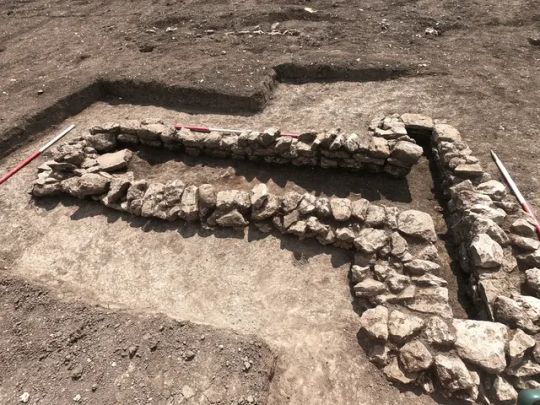
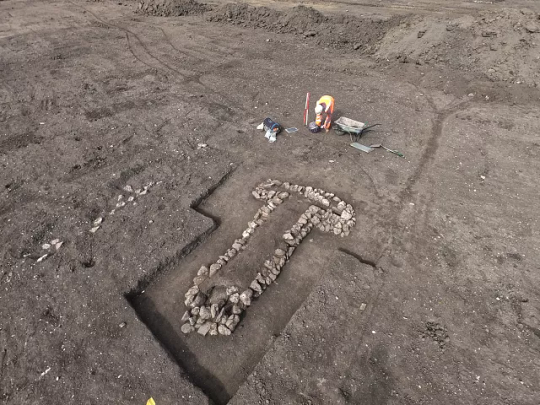

‘Remarkable’ Roman Villa Discovered Under Housing Development
Archaeologists have unearthed a “remarkable” Roman villa complex on a housing development site in a small English village.
The complex was decorated with painted plaster, mosaics and there was a collection of tiny, tightly-coiled lead scrolls suggesting some sort of ritual or pilgrimage might have taken place there, according to a press release.
The villa in Grove would have been “central for this area of Oxfordshire,” Francesca Giarelli, project officer for Red River Archaeology Group and the site’s director, said on Thursday.
She described a building that likely had multiple levels. The structure, which stretched across 1,000 square meters (10,800 square feet) on just the ground floor, was probably visible for miles, Giarelli added.
Hundreds of coins, plus rings, brooches, mosaic tesserae and painted plaster with floral motifs have been uncovered during the year-long excavation, allowing archaeologists to pinpoint a long period of Roman activity at the site from the 1st or 2nd century into the late 4th or early 5th century.

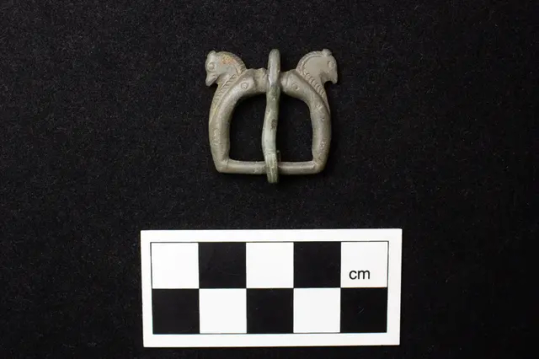
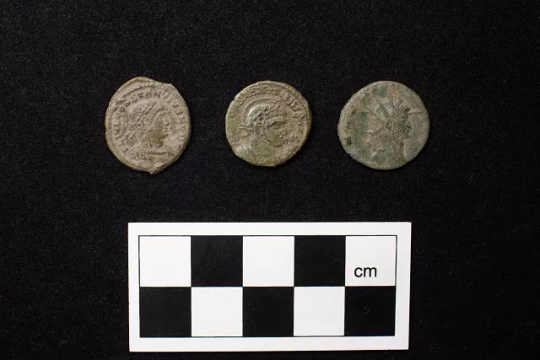


Archaeologists also discovered an aisled building, a bigger and more impressive hall-like structure built after the villa once the family that owned it became richer over time, Giarelli said.
In Roman times, villas were not simply residential dwellings but more like “small administrative centers,” Giarelli explained, often with responsibilities for maintaining roads, planning the crops surrounding it and acting as a “safe space” to store food products during unstable times.
Even in the late Roman period, this particular villa continued to show signs of human activity.
A horse-headed buckle, dated to 350-450 AD, suggests the presence of late Roman elites or someone who still wished to be associated with that period, though such buckles can also be associated with early Anglo-Saxon burials, archaeologists said in a statement.
Excavating the site, described as “remarkable” in a press statement, began before the housing developers Barratt and David Wilson Homes started their building work and after two evaluation trenches had been dug.
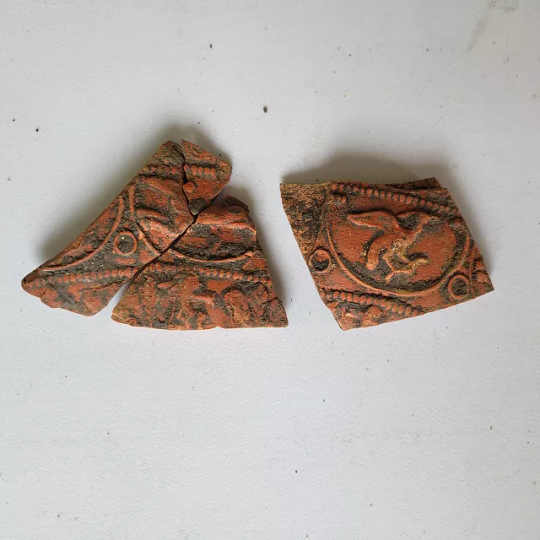

The trenches revealed a “high potential for archaeological presence,” Giarelli said, prompting an archaeological investigation, which began two months before the building work and is still ongoing.
The site still holds some mysteries to unravel in the continuing excavations.
Archaeologists haven’t yet found “where all the people ended up,” Giarelli said, though they believe there is a burial somewhere on the site, and there have been some artifacts, such as the lead scrolls, that point toward a sanctuary present, but still hidden underground.
By Issy Ronald.

#‘Remarkable’ Roman Villa Discovered Under Housing Development#The villa in Grove#Grove in Oxfordshire#ancient artifacts#archeology#archeolgst#history#history news#ancient history#ancient culture#ancient civilizations#roman history#roman empire#roman art
37 notes
·
View notes
Text
accountant thoughts:
so there's a certain amount of fixed costs associated with water systems and wastewater treatment, right? like. sewage. making human shit less toxic. keeping water clean and then getting that water into houses. there are ways that costs increase the more the system gets used, but it would also cost money if it just sat there. it might even cost more money, because the systems aren't designed to shut down and just sit there. if the whole city were abandoned except for one house, and it became the only house served by the water department and the sewer system, there would still be all that base cost associated with the various systems and plants and so on. i'm simplifying because i don't actually know how all that works.
anyway. so from a financial perspective, water and wastewater treatment get cheaper the more people you have being served by the system. because that's more people you can divide the cost up by. that's how the fixed cost works. the fixed cost is less per person the more people there are.
a lot of prisons in the usa are in small towns and rural areas. that's how prison gerrymandering works. you take people out of the cities where they actually live, and you stick them in a prison in bumfuck, and then you say "i represent the 5,000 residents of bumfuck" while ignoring that 4,000 of those residents are in a prison and can't vote.
prisons use a lot of water!
so when they're doing the budgets in a small town, if they say, "here is how much we think it's going to cost to run for the next year, here is how many gallons of water we estimate being used, we will divide the cost by thousands of gallons and that's what we're going to charge", what impact does a prison have? what if a prison represents half of all water usage? how much higher would residential bills be without the prison there? is it a private prison, or is it the state that's paying for that prison's water usage? at what point can it be said that in certain rural areas infrastructure is subsidized by the state through the imprisonment of people primarily from urban areas where infrastructure is allowed to fail
#original#a local prison closed and residents were big mad about the water bills going up#doing the math behind the scenes on how much their bills were previously being subsidized by the prison has haunted me ever since!#idk if i'm coherent i was just reading about more failed urban infrastructure and wondering things
630 notes
·
View notes
Note
How do I train an Espurr to control/safely use its powers? They're so cute, but I'm worried it'll get spooked and accidentally flatten my house or something...
eeeesh. this is why i'm always iffy about raising espurr in residential areas. my only advice is to give your espurr ways to exert its psychic power that aren't destructive (battling in Reserved Zones is a must) and making sure that it has places for relaxation and destressing at home, so it associates the home with rest and outside with energy.
310 notes
·
View notes
Note
Re zoning regulation reform: could you go into detail as what that would look like in terms of wiping the slate clean. I feel like it would be better to go the houston route and just be zoning free
You do not want to go the Houston route.
youtube
Houston may claim to be "zoning-free" - and to be fair, it doesn't have some of the more common regulations on land use, or density, or height restrictions (more on this in a minute) - but the reality is far more complicated and the status quo is not one that's friendly to the interests of working-class and poor residents, or to the possibility of sustainable urbanism.
The answer to NIMBYism isn't to abolish all regulations and let the free market rip, it's to surgically target zoning, planning, and litigation that is used against affordable housing, public/social housing, mass transit, clean energy, and walkable neighborhoods, and to replace it with new forms of regulation that encourage these forms of development.
So let's take take these categories in order.
Zoning
As I tell my Urban Studies students, zoning is both one of the most subtle and yet comprehensive ways in which the state shapes the urban environment - but historically it has been used almost exclusively in the interests of racism and classism. Reforming zoning requires going over the code with a fine-toothed comb to single out all the many ways in which zoning is used to make affordable housing impossible:
The most important one to tackle first is density zoning and building heights limitations. The former directly limits how many buildings you can have per unit of land (usually per acre), while the latter limits how big the buildings can be (expressed either as the number of stories or the number of feet, or as both). Closely associated with these zoning regulations are minimum lot size regulations (which regulate how much land each individual parcel of real estate has to cover, and thus how many how many housing units can be built in a given area), and lot coverage, setbacks, and minimum yard requirements (which limit how much square footage of a lot can be built on, and what kinds of structures you can build).
the other big one is use zoning. To begin with, we need to phase out "single use" zoning that designates certain areas as exclusively residential or commercial or industrial (a major factor that drives car-centric development, makes walkable neighborhoods impossible, and discourages the "insula" style apartment building that has been the core of urbanism since Ancient Rome) in favor of "mixed use" zoning that allows for neighborhoods that combine residential and commercial uses. Equally importantly, we need to eliminate single-family zoning and adopt zoning rules that allow for a mix of different kinds of housing (ADUs, duplexes and triplexes, rowhouses/terraced houses, apartment buildings).
finally, the most insidious zoning requirements are seemingly incidental regulations. For example, mandatory parking minimums not only prioitize car-dependent versus transit-oriented development but also eat up huge amounts of space per lot. The most nakedly classist is "unrelated persons" zoning, which is used to prevent poorer people from subdividing houses into apartments, which zaps young people who are looking to be roommates and older people looking to finance their retirements by running boarding houses or taking in lodgers, as well as landlords looking to convert houses from owner-occupied to rental properties.
So I would argue that the goal of reform should be not to eliminate zoning, but rather to establish model zoning codes that have been stripped of the historical legacies of racism and classism.
Planning
Similar to how zoning shouldn't be abolished but reformed, the correct approach to planning isn't to abolish planning departments wholesale, but to streamline the planning process - because the problem is that right now the planning process is too slow, which raises the costs of all kinds of development (we're focusing on housing right now, but the same holds true for clean energy projects), and it allows NIMBY groups to abuse the public hearings and environmental review process to block projects that are good for the environment and working-class and poor people but bad for affluent homeowners.
As those Ezra Klein interviews indicate, this is beginning to change due to a combination of reforms at both the state and federal level to speed up the CEQA and EPA environmental review process in a number of ways. For example, one change that's being made is to require planning agencies and environmental agencies to report on the environmental impact of not doing a project as well, to shift the discussion away from petty complaints about noise and traffic and "neighborhood character" (i.e, coded racism and classism) and towards real discussions of social and environmental justice.
At the same time, more is needed - especially to reform the public hearing process. While originally intended by Jane Jacobs and other activists in the 1970s as a democratic reform that would give local communities a voice in the planning process, "participatory planning" has become a way for special interests to exercise an unaccountable veto power over development. Because younger, poorer and more working class, and communities of color often don't have time to attend public hearing sessions during the workday, these meetings become dominated by older, whiter, and richer residents who claim to speak for the whole of the community.
Moreover, because community boards are appointed rather than elected and public hearings operate on a first-come-first-serve basis, an unrepresentative minority can create a false impression of community opposition by "stacking the mike" and dialing up their level of militancy and aggression in the face of elected officials and civil servants who want to avoid controversy. (It's a classic case of diffuse versus concentrated interests, something that I spend a lot of classroom time making sure that my students learn.)
Again, the point shouldn't be to eliminate public hearings and other forms of participatory planning, but to reform them so that they're more representative (shifting public hearings to weekends and allowing people to comment via Zoom and other online forums, conducting surveys of community opinion, using a progressive stack and requiring equal time between pro and anti speakers, etc.) and to streamline the review process for model projects in categories like affordable housing, clean energy, mass transit, etc.
Litigation
Alongside the main planning process, there is also a need to reform the litigation process around development. In addition to traditional tort lawsuits from property owners claiming damage to their property from development, a lot of planning and environemntal legislation allows for private groups to sue over a host of issues - whether the agency followed the correct procedures, whether it took into account concerns about this impact or that impact, and so forth.
As we saw with the case of Berkeley NIMBYs who used CEQA to block student housing projects over environmental impacts around "noise," this process can be used to either block projects outright, or even if the NIMBYs eventually lose in court, to draw out the process until projects fall apart due to lack of funding or the proponents simply lose their patience and give up.
This is why we're starting to see significant reforms to both state and federal legislation to streamline the litigation process. The categorical exemptions from review that I discussed above also have implications for litigation - you can't sue over reviews that didn't happen - but there are also efforts to speed up the litigation process through reducing what counts as "administrative record" or by putting a nine-month cap on court proceedings.
Again, this is an area where you have to be very surgical in your changes. Especially when the politics of the issue divide environmental groups and create odd coalitions between labor, business, climate change activists, and anti-regulation conservatives, you have to be careful that the changes you are making benefit affordable housing, clean energy, mass transit and the like, not oil pipelines and suburban sprawl.
#public policy#housing#zoning#policy history#urban planning#public housing#social housing#yimbys#yimbyism#affordable housing#urban studies#urbanism#houston#nimbyism#nimbys#environment#climate change#clean energy
93 notes
·
View notes
Text
How YMCA inadvertently created a gay colony
After the First World War, when moralists went a bit too far in their efforts to put American soldiers off female prostitutes and accidentally made them homosexuals, many righteous citizens noticed that New York was full of fairies, that is, effeminate gay men. Studies conducted right after the war confirmed it: a great number of sailors and soldiers had homosexual relationships, and they did not want to return to their smaller hometowns.
And then there were the moral dangers just waiting for young men in boarding and rooming houses or bachelor flats, where unmarried men were isolated from women. Many homosexuals, fairies and queers alike, brought their lovers to their flats. As a rule, as long as they were quiet enough, no one complained. The YMCA (Young Men’s Christian Association) found a solution: secure residential hotels for such men, which were supposed to reform them. By WW1 and especially afterwards, they had become known as the headquarters for homosexuals.
Should it be surprising? Not really. It was an all-male space, a haven for anyone who was interested in men. The founders didn’t consider that it was easier for male couples to hide in a place where all men shared rooms with men, rather than in an ordinary rooming house where men were supposed to live alone.
Besides, in these hotels, the YMCA offered libraries, gymnasiums, and swimming pools for unmarried migrants. Over the years in the beginning of the 20th century, the number of gay bathhouses decreased, so these swimming pools, where men were usually naked, became very popular among fairies and queers. They gathered in the hotels’ dining rooms and met their friends there, just as the founders planned... Only, it wasn’t helping in reforming the residents: they steadily turned YMCA hotels into a big part of the gay world. Many homosexual men made their first steps in this world in the YMCA residential hotels.
Some men actually called them “gay colonies”, while others, a bit later, joked that the letters Y, M, C, A stood for “Why I’m So Gay”. New Yorkers even gave fake addresses, pretending that they were from other towns, to get a room in such a hotel for a few days. It was free for all, how could one miss such a chance?

97 notes
·
View notes
Text
by Gilead Ini
January 12 Update:
AP Amends False Claim
After CAMERA informed journalists of the problems detailed here, the Associated Press changed its piece, noting that a study of damage in Gaza counted structures that were "likely either damaged or destroyed" as opposed to "destroyed." The other misrepresentations were not substantively addressed, and no appended correction informs readers of the change. See below for a detailed update.
On Thursday, the Associated Press argued that Israel’s fight against Hamas “now sits among the deadliest and most destructive in history.”
Before sunrise the next morning, the language was quietly changed to instead cite wars in “recent” history. But the stealth edit did little to redress the many glaring problems in the piece, the latest in a parade of news stories that invent, distort, or otherwise misuse statistics to unfavorably compare the Gaza war with others across the globe wars.
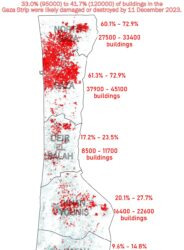
An image by researchers Corey Scher and Jamon Van Den Hoek refers to "likely damaged or destroyed" buildings.
The reason for this assembly line of manipulations, it seems, is precisely to support overblown charges like the one that opens the AP story: Israel’s response to Hamas’s Oct. 7 massacre is the most destructive… the deadliest… the biggest… the worst….
Urban combat is a notoriously destructive endeavor. Add subterranean warfare — the need to deal with the combat tunnels that snake below Gaza’s neighborhoods and serve as a lifeline for Hamas militants and a death trap for Israelis — and there’s no shortage of ruin in Gaza that could be discussed on its own terms.
But apparently that wouldn’t suffice. So cue the embellishments — like the one at the very center of the AP piece:
Israel’s offensive has destroyed over two-thirds of all structures in northern Gaza and a quarter of buildings in the southern area of Khan Younis, according to an analysis of Copernicus Sentinel-1 satellite data by Corey Scher of the CUNY Graduate Center and Jamon Van Den Hoek of Oregon State University, experts in mapping damage during wartime.
Destroyed? The satellite data used by the study’s authors can suggest which buildings have been damaged, but not whether they have been destroyed. When we double-checked with the researchers, Van Den Hoek reiterated that they only count structures as “likely damaged or destroyed” because, he explained, “we don't yet have means of distinguishing categories of damage severity.”
Which means the AP’s claim is egregiously false. And that’s hardly its only manipulation.
The second sentence, meant to support the lead sentence’s claim about the Gaza war being among the “most destructive” wars, reads:
In just over two months, the offensive has wreaked more destruction than the razing of Syria’s Aleppo between 2012 and 2016, Ukraine’s Mariupol or, proportionally, the Allied bombing of Germany in World War II.
The worst… what? By what measure of damage does Gaza surpass these conflicts? The Associated Press doesn’t say.
The most destructive… the deadliest… the biggest… the worst…
The piece later claims that 33 percent of buildings across Gaza and two-thirds in northern Gaza have been “destroyed” (again, a falsehood counting any degree of damage as destruction). But the UN High Commissioner for Human Rights, which the AP has frequently cited in the past, has assessed that in Mariupol, one of the AP’s points of comparison, “up to 90 per cent of residential buildings have been damaged or destroyed.” The Associated Press itself had reported that Russian munitions left their mark “on nearly every building” in Mariupol.
Is the AP referring to the absolute number of damaged houses rather than the percentage? Maybe. But it would be an odd comparison, since Mariupol is less than half the size of the Gaza Strip. Aleppo, too, is half as big as the Hamas-run territory — and the relevant land area is even smaller, since the rebel militias that came under devastating Syrian and Russian bombardment had only occupied a portion of the city.
So does the claim refer to the density of destruction? If so, then again, it is dubious comparison. The damage in Aleppo was not nearly as densely packed as other in Syrian cities, including Raqqa, Homs, Deir ez Zor, Damascus, and Hama. Why would the AP ignore more extreme examples?
Whatever the reporter means to compare, it’s clear that the piece doesn’t play fair. Consider this passage:
During the 2014-2017 campaign to defeat IS in Iraq, the coalition carried out nearly 15,000 strikes across the country, according to Airwars, a London-based independent group that tracks recent conflicts. By comparison, the Israeli military said last week it has conducted 22,000 strikes in Gaza.
The most…. But not really. The Associated Press cherry-picked this particular Iraq war, but chose to ignore entirely the 2003 Iraq war, in which US-led forces dropped over 29,000 munitions on Iraqi targets in the first 30 days of fighting — double the rate of Israel, which dropped the same estimated number of munitions but in twice the time.
And what does the AP mean when claiming, at the top of the piece, that the Gaza offensive has caused more destruction “proportionally” than the Allied bombing of Germany in World War II?
The author later elaborates:
By some measures, destruction in Gaza has outpaced Allied bombings of Germany during World War II.
Between 1942 and 1945, the allies attacked 51 major German cities and towns, destroying about 40-50% of their urban areas, said Robert Pape, a U.S. military historian. Pape said this amounted to 10% of buildings across Germany, compared to over 33% across Gaza, a densely populated territory of just 140 square miles (360 square kilometers).
In other words, the proportion of destroyed buildings in the Gaza Strip is greater than in Germany only when comparing the small, densely packed Strip to the entirety of Germany, which in its current borders is nearly 1000 times larger than Hamas’s territory, and which was spaced out to a small fraction of Gaza’s population density. We can consider a closer equivalent within Germany: The city of Hamburg, which is far closer to the size of the Gaza Strip, and where during just eight-days in 1943, four Allied bombing killed around 40,000 people and destroyed over half of the city’s homes.
And if the Associate Press considers Allied bombing during World War II an informative point of comparison, why pick and choose? In just two days of bombing in 1945, the US killed about 100,000 civilians in Tokyo and destroyed 250,000 buildings.
We can forgive the AP for failing to find a perfect analogy. “[N]o military in the world has faced the context Israel faces today,” says John Spencer, a top expert in urban warfare. “No military in the world has fought a war against a military of 30,000 plus fighters (defenders) embedded in underground cities purposely interwoven into the dense civilian population” while dealing with incessant, indiscriminate rocket fire into their own cities. But that doesn’t excuse the AP “hunting for data,” as Spencer termed it, to promote a narrative.
Nor would the “everybody is doing it” excuse suffice — though it is true that plenty of others, including some of the largest and most influential newspapers, are likewise guilty of inventing and manipulating statistics.
A Parade of Distorted Statistics
• Less than a week into the war, the Washington Post reported that Israel had already dropped the same quantity of munitions on Gaza as the US dropped on Afghanistan in its most intense full year of bombing:
"Israel is dropping in less than a week what the U.S. was dropping in Afghanistan in a year, in a much smaller, much more densely populated area, where mistakes are going to be magnified," said Marc Garlasco, a military adviser at the Dutch organization PAX for Peace and a former U.N. war crimes investigator in Libya. He helped plan airstrikes for the Pentagon during the U.S. invasion of Iraq.
The highest number of bombs and other munitions dropped in one year during the war in Afghanistan was just over 7,423, Garlasco said, citing U.S. military records. During the entire war in Libya, the NATO alliance reported dropping more than 7,600 bombs and missiles from planes, according to a U.N. report.
But this is wildly false. The US had dropped 17,500 munitions on Afghanistan in just 76 days of bombing in 2001. The newspaper eventually corrected after outreach by CAMERA, but not before the fake statistic was echoed by the Los Angeles Times’ managing editor, NBC’s Mehdi Hasan, Al Jazeera, the Guardian, J Street, and members of Congress.
• In a front-page story published on Nov. 26, the New York Times claimed that “Israel has killed more women and children than have been killed in Ukraine.” This is a flagrant misrepresentation, which relied on Ukraine casualty figures that, per the newspaper’s own source, are “considerably” lower than the actual number of civilian deaths. The paper stealthily changed its language online, but it left the error uncorrected in print.
The piece also claimed that “more women and children have been reported killed in Gaza in less than two months than the roughly 7,700 civilians documented as killed by U.S. forces and their international allies in the entire first year of the invasion of Iraq in 2003,” citing estimates from a group called Iraq Body Count. But again, data from the Times own source revealed the newspaper’s egregious dishonesty. The overwhelming majority the Iraq casualties occurred in a just over a month of fighting, after which the regime was overthrown and major combat operations had ended. So contrary to the newspaper’s argument, the rates of claimed civilian casualties in the two conflicts were essentially equal. The newspaper refused to correct.
• Both the Times story cited above and a piece in the Wall Street Journal had misrepresented comments by a senior State Department official about casualties in Gaza. The Times reported, “Barbara Leaf, the assistant secretary of state for Near Eastern affairs, told a House committee this month that American officials thought the civilian casualties were ‘very high, frankly, and it could be that they’re even higher than are being cited.’” Similarly, the Journal claimed that “The U.S. State Department’s highest official for Middle East affairs said that the civilian death toll in Gaza is likely higher than estimates suggest.” The official, though, wasn’t speaking about the civilian death toll, but rather the total number of deaths, Hamas included.
• This week, on Dec. 22, the Washington Post reported that the displacement of two million people in Gaza’s population was “the largest displacement in the region since Israel’s creation in 1948.” On Syria, just on the other side of Israel from Gaza, 12 million people have recently been displaced, according to the United Nations. In Yemen, over four million have been displaced.

The image of a New York Times headline shared on X by Aviva Klompas.
• That same day, the print edition of the New York Times ran a large headline announcing, “Gaza Deaths Surpass Any Arab War Losses in 40 Years,” a reference to the Hamas government’s claim of 20,000 deaths in its fight against Israel. The same New York Times had previously reported on 470,000 deaths counted in Syria’s war; 150,000 deaths counted in Yemen’s war; 150,000 deaths counted in Lebanon’s civil war; 500,000 Iraqi deaths counted from the country’s war with Iran; and 150,000 Iraqi deaths during the gulf war. (The text of the article itself correctly referred to “Arab conflicts with Israel,” though that doesn’t help those who relied on the newspaper’s headline to be accurate.)
The Associated Press piece fits neatly into this parade of flamboyant distortions, and serves as just the latest example of how a zeal to push a narrative of Israeli excesses sends sober journalism slinking ever further into the distance.
Update: Associated Press Corrects
After CAMERA informed AP editors of
the inaccurate claim that an analysis by Scher and Van Den Hoek counted “destroyed” buildings as opposed to damaged ones;
the questionable claim that the Gaza war has wreaked more destruction than Russia’s offensive in Mariupol, despite UN estimates showing more damage in the latter; and
the arbitrary comparison of Israeli airstrikes to those in 2014-2017 Iraq, while inexplicably ignoring the much larger number of airstrikes in 2003 Iraq
the agency redressed the first issue. Where the piece had characterized a study as finding that "Israel’s offensive has destroyed over two-thirds of all structures in northern Gaza," it now correction notes that the study looked at "likely either damaged or destroyed."
A minor modification was made to the language about Mariupol. Rather than account for the UN estimate of destruction there, AP changed the statement of fact that "the offensive has wreaked more destruction than" the razing of Mariupol to instead state that "researchers say the offensive has wreaked more destruction."
The cherry-picked data about Iraq was left unchanged.
While the date at the top of the story was changed from Dec. 22 to Jan. 11, there is no indication that a correction was made to the story, as journalistic norms would call for.
#associated press#washington post#new york times#media bias#statistics#lying with statistics#hamas#gaza#israel
31 notes
·
View notes
Text
Vancouver Tenants Union
http://www.vancouvertenantsunion.ca/
Here's the full petition:
Petition for Social Housing at 105 Keefer
Dear Premier David Eby, Minister Ravi Kahlon, and Mayor Ken Sim,
尊敬的尹大衛省長、柯議倫部長和沈觀健市長,
We, the undersigned low-income residents of Chinatown and the Downtown Eastside (DTES) and their supporters, write this petition to express our deep concern and opposition to the proposed luxury condo development at 105 Keefer Street by Beedie Living and to urge you and your government to intervene and take immediate action to develop 100% social housing at welfare and pension rates on the property instead. As Vancouver is facing a worsening housing and affordability crisis, there is a resounding need across the city for housing affordable to those with low incomes, most urgently in the DTES and Chinatown.
我們,下方連署的唐人街和溫市中心東端 (DTES) 的低收入居民及其支持者,在此呈上請願書,以表達我們對 Beedie房地產開發商提出在奇化街 105 號豪華公寓建設申請的深切關注和反對,並敦促您和您的政府立即採取行動,開發福利和養老金可負擔的 100%社會房屋。 由於溫哥華正面臨日益惡化的住房和負擔能力危機,低收入者迫切需要負擔得起的住房,而在市中心東端和唐人街尤其緊迫。
On Thursday, May 25th, over 500 residents of Chinatown and the DTES, including Chinese seniors, DTES residents (housed and unhoused), and allies, gathered for a Community Council. This gathering marked the largest mobilization in Vancouver’s Chinatown in over a decade, demonstrating widespread community resistance to the billionaire developer’s plans for luxury condos at 105 Keefer St. Despite the overwhelming opposition expressed by the community, the condo proposal includes zero units of social housing, exacerbating the already dire housing crisis faced by our community.
在5月25日星期四,住在唐人街和市中心東端的500多名街坊,包括華裔年長者、市中心東端(有住房和無住房)以及各方盟友,聚集在105奇化街廣場召開社區大會。這次大會標誌著溫哥華唐人街十多年來規模最大的公民動員行動,表明了這個社區對億萬富翁開發商在奇化街 105 號建設豪華公寓的計劃的強烈抵制。儘管這個社區已經明確地表示反對,這份豪華公寓提案仍然沒有提及任何社會住房單位,此開發計畫加劇了我們社區本已嚴峻的住房危機。
During the Community Council meeting, residents voted against the luxury condo development, instead calling unanimously for the development of 100% social housing at welfare and pension rates.
在社區大會的會議上,居民投票表示反對豪華公寓的建設,並一致呼籲開發福利和養老金可負擔 100%社會房屋。
On Monday, May 29th, a rally was held at city hall, where 200 individuals, including 130 Chinese seniors, demonstrated their unwavering opposition to the project. Overwhelmed by the strength of the Chinatown community, the DPB chose to delay their decision until June 12th.
在5月29日星期一,華埠居民在市政廳舉行了一場集會,其中包括130名華裔長者在內的200多人再次表達了他們反對該項目的堅定立場。被唐人街社區的強大組織力量所震攝下,發展許可委員會選擇將他們的決定推遲到6月12日。
Since 2012, the residential base of Chinatown and DTES have been organizing against this development for over a decade. Beedie has attempted to get approval for his luxury condos 5 times, and each time we have fought and won. The most recent round of fighting was in 2017 and despite losing again Beedie is back. Instead of doing the necessary work to put in an application that would pass at the Development Permit Board, Beedie has chosen to spend the last few years taking the municipal government to court. And now, he has been granted another audience with the Development Permit Board. These fights have been won by us, the thousands of hard-working people who live in the neighbourhood, not organizations who claim to represent us.
自2012年起,唐人街和市中心東端的居民已經組織起來反對這項開發計劃十多年了。Beedie Living五次試圖申請開發其豪華公寓,而每一次我們都奮起抗爭並取得了勝利。儘管2017年開發申請再次被拒絕,Beedie不顧社區居民的訴求,在過去開發申請被拒的幾年間,Beedie Living不投入準備符合居民需求以及可在開發許可委員會通過的申請,而是選擇不斷將市政府告上法庭。在今年五月初,Beedie又獲得了另一次在發展許可委員會開聽證會的機會。這些鬥爭的勝利以及抗議的聲音屬於我們,居住在這個社區的成千上萬辛勤工作的租客居民,而不是那些聲稱代表我們的組織。
Organizations like the Chinese Benevolent Association of Vancouver, Chinese Freemasons of Vancouver, Dr. Sun Yat-Sen Classical Chinese Garden Society, Chinese Cultural Centre of Greater Vancouver, Vancouver Chinatown Merchant’s Association, Vancouver Chinatown Business Improvement Association Society, and Vancouver Chinatown Foundation do not represent our voice.
這些組織並不代表我們的聲音,例如:溫哥華華人總會、溫哥華華人共濟會、孫中山古典園林協會、大溫哥華華人文化中心、溫哥華唐人街商會、溫哥華唐人街商業改進協會以及溫哥華唐人街基金會等。
We implore you and the BC government to take immediate action and demonstrate your commitment to the poor and working-class citizens of Vancouver. We have one clear demand: That the government take and use the land at 105 Keefer St. for the purpose of developing social housing at welfare and pension rates.
我們懇請您們和卑詩省政府立即采取行動,並展示您們對溫哥華貧困和工薪階層居民的承諾。我們有一個明確的要求:政府收回並利用位於105奇化街的土地來建設福利和養老金可負擔的社會房屋。
We have been fighting for this goal for over a decade, and it is time for the government to act decisively and fulfil its responsibility to its constituents.
我們為這個目標奮鬥了十多年,現在是政府實施果斷行動、兌現選民承諾的時候。
We urge you to heed our call, listen to the voices of the community, and take the necessary steps to ensure the development of 100% social housing at welfare and pension rates at 105 Keefer. Your prompt action is necessary to affirm that your government stands firmly with poor and working-class people in Vancouver.
我們敦促您響應我們的呼籲,傾聽社區的聲音,並采取必要的措施來確保在105奇化街興建符合福利和養老金標準的百分百社會住房。您們的迅速行動是必要的,以表示您們的政府會堅定地支持溫哥華的貧困和工薪階層居民。
Thank you for your attention to this matter, and we look forward to your swift response.
感謝您對此事的關注,我們期待您們的即時回應。
Sign here: http://www.vancouvertenantsunion.ca/social_housing_105_keefer?recruiter_id=20352
68 notes
·
View notes
Text
Now that the touristic season has started again (though, let's be honest, in many places now the tourist season is the whole year and it never stops). I'll translate a part of this article I saw last year about the emergency in Menorca.
The neighbours' association took a drastic decision. What do you think about it?
Binibèquer, reserved right of admission
The association of home owners of the Menorcan town has taken drastic measures against the effects of touristic massification
First, it was some spoken complaints, then a few articles on local newspapers. This summer it was already signs in red letters, in British style, over the white lime walls: "Rude tourists are not welcome". They are so rude, that they walk in houses without asking for permission so that they can take a picture, or they shout, or laugh, or get drunk and party on the street at any hour, or they use any white wall as a bathroom. Some also leave all kinds of litter and dirt on the window sheds, on the doors or on the floor.
This is the truth that hides behind the thousands of photos and selfies that get uploaded to social media with the white houses of Binibèquer Vell in the back. Not of the fisherman's village of Binibèquer Vell. Just the residential area built in the 1970s in Sant Lluís, in the south of Menorca. This scenery, the perfect background for a wedding picture, looses all that makes it idyllic when it stops being a flat image and becomes real life. With cigarettes, bad smells and crowds.
The owners of these 165 little houses have had enough of this invasion that doesn't let them sleep at night, that doesn't let them sit outside nor eat calmly without worrying that some stranger will walk into their living room looking for a new angle of that place they find so "picturesque".
After asking for help to the Sant Lluís city hall, go Menorca's Tourism Agency and the Balearic Islands' Government, the community has taken two drastic measures: surrounding the area in a fence that will only be opened between 10am and 10pm, and registering the brand and image rights so that nobody can make money off their homes. This means that any influencer who wants to take a photo to subtly advertise a t-shirt, a lipstick or a pair of shoes, will have to pay the image rights for using the residential area's image. Or if they go live on Twitch or upload a video on TikTok with the objective of making money. If they don't pay it, the association will sue them to claim the money.
Advertising agencies will also not be able to film their spots or music videos for publicity campaign there if they haven't previously paid the price.
Only authorised tourist guides, who know the history of this residential area, will open the fence. The home owners are sick of hearing guides say in all languages that this was a gift from [fascist dictator] Franco probably to the island's authorities.
It's not a fishermen's village, it's a residential area. It's not. It doesn't matter how much Instagramers and some tourist guides keep repeating it, Binibèquer Vell is not a fishermen's village. It has never been so, regardless of media including it in their list of 10 best places to take a picture in this summer, for example. (...)
They say that Gertrude Stein told Robert Graves "Mallorca is a paradise, if you can resist it.". The owners of Binibèquer, in Menorca, will surround it with a fence to get away from Hell.
#actualitat#binibèquer vell#menorca#illes balears#tourism#touristic massification#holidays#touristification#minorca
74 notes
·
View notes
Text
Broadway, New York City
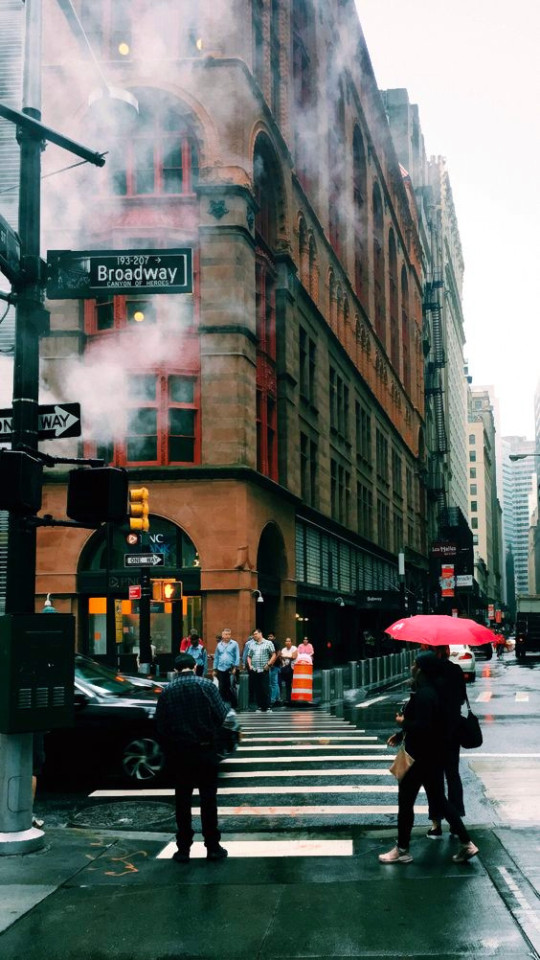
Steam Heating in the Concrete Jungle: A Comprehensive Analysis of New York City's Historic and Sustainable Heating Infrastructure
Introduction
1.1 Historical Overview of Steam Heating
Steam heating has a storied history in New York City, dating back to the mid-1800s. Before steam heating, buildings relied on individual coal-burning stoves or fireplaces for warmth, resulting in uneven heating and numerous health hazards. The advent of steam heating, pioneered by engineer Stephen Gold in the 1850s, marked a significant advancement in heating technology. It offered a centralized heating solution, where steam generated in large plants could be distributed efficiently through a network of underground pipes to individual buildings, providing consistent and reliable heat throughout the city.
1.2 Advantages and Disadvantages of Steam Heating
The adoption of steam heating brought several advantages to New York City. It allowed for the elimination of individual heating units in each building, reducing maintenance costs and fire risks. Steam heating systems operate quietly, without the noise associated with forced-air systems, contributing to a more peaceful urban environment. Additionally, steam heating radiators became architectural features, adding a distinctive charm to buildings' interiors.
However, steam heating also presented challenges. One of the primary concerns was heat loss during steam transportation through the extensive underground pipe network. Proper insulation became crucial to mitigate energy waste and ensure efficient heat distribution. Additionally, as the steam system aged, it became susceptible to leaks, and repairing the aging infrastructure posed logistical and financial hurdles.
1.3 Comparison with Other Heating Systems
Compared to forced air and electric heating systems, steam heating offered unique benefits. Forced air systems, prevalent in modern construction, tend to create drafts and circulate dust, potentially exacerbating respiratory issues. Steam heating's ability to deliver consistent warmth without air movement was preferred in many buildings. Electric heating, while convenient and clean, often proved less efficient and costlier, especially for larger buildings served by the steam system.
How Steam Heating Works in New York
2.1 Steam Generation in Centralized Plants
The heart of the New York City steam heating system lies in its centralized plants. These large facilities, situated strategically throughout the city, house powerful boilers that generate steam from various energy sources, including natural gas, oil, and coal. In recent years, efforts have been made to transition towards cleaner fuels and renewable energy options, aligning with the city's sustainability goals.
2.2 Distribution of Steam in Underground Pipes
Once steam is produced, it is conveyed through an extensive network of underground pipes, known as steam mains. These mains crisscross the city, providing steam to thousands of buildings. The pipes are insulated to minimize heat loss, maximizing the efficiency of the distribution process.
2.3 Steam Radiators and Heat Exchange
Upon reaching individual buildings, the steam is directed to steam radiators or heat exchangers, depending on the building's size and heating requirements. Steam radiators are common in residential buildings, where the steam enters the unit and releases its latent heat as it condenses back into water, effectively warming the surrounding air. Heat exchangers are prevalent in commercial and industrial settings, where the steam's heat is transferred to the building's air or water distribution systems.
2.4 Steam Traps and Venting
Steam traps are essential components of the steam heating system. They are designed to remove condensate, the water formed when steam cools down, from the system. Proper venting is equally crucial, as it releases air and non-condensable gases from the pipes, preventing air locks and ensuring efficient steam flow. Specialized venting devices, such as air vents and steam traps, are installed throughout the system to maintain its optimal performance.
New York City Steam Heating System
3.1 Overview of NYC Steam System
The New York City steam heating system stands as one of the largest and oldest in the world. The responsibility for its operation and maintenance lies with private utility companies, which have historically managed the network's intricate web of steam mains, radiators, and heat exchangers.
3.2 Steam Plants in New York City
New York City's steam plants are strategically located to serve the varying heating demands of different neighborhoods. These plants are equipped with modern boilers and state-of-the-art emission control technologies to reduce environmental impacts. Efforts to further improve air quality and sustainability are continuously underway.
3.3 Steam Distribution Network
The steam distribution network encompasses over 100 miles of steam mains, which interconnect and branch to supply steam to individual buildings. The network's design considers factors such as pressure requirements, building density, and historical demand patterns to ensure an efficient and consistent supply of heat throughout the city.
3.4 Maintenance and Upgrades of NYC Steam System
Maintaining such an extensive steam heating system requires regular inspections and maintenance. The aging infrastructure presents challenges, making ongoing upgrades essential to ensure the system's longevity and continued efficiency. Modernization efforts include replacing older pipes with more robust materials, improving insulation, and upgrading boiler technologies to enhance energy efficiency.
Heating Buildings with Steam
4.1 Steam Heating in Residential Buildings
Steam heating systems are a common sight in older residential buildings across New York City. The iconic steam radiators, often found beneath large windows, have become cherished architectural elements. Residents appreciate the steady and cozy heat these systems provide during the harsh winter months.
4.2 Steam Heating in Commercial and Industrial Buildings
Commercial and industrial buildings extensively utilize steam heating due to its ability to meet the substantial heating demands of such structures. Heat exchangers play a crucial role in these settings, where steam heat can be efficiently transferred to large air or water distribution systems, catering to diverse heating requirements.
4.3 Steam Heat vs. Forced Air: Considerations and Comparisons
In the perennial debate between steam heating and forced air systems, each has its merits. While steam heating boasts even heat distribution, quiet operation, and a lack of airborne dust circulation, forced-air systems can also provide air conditioning and ventilation, adding flexibility to building comfort. The choice between these heating methods depends on the specific needs and priorities of each building owner or occupant.
Efficiency and Sustainability of New York City Steam Heating
5.1 Assessing the Efficiency of Steam Systems
Efficiency is a critical aspect of the steam heating system, as it directly affects operating costs and environmental impacts. Regular assessments of individual steam systems and the overall distribution network are conducted to identify opportunities for improvement. Efforts are focused on reducing heat loss, optimizing boiler performance, and upgrading insulation to maximize energy efficiency.
5.2 Environmental Considerations and Emissions
Given the environmental challenges of fossil fuel-based energy sources, New York City is actively exploring ways to reduce emissions associated with steam heating. Increased reliance on cleaner fuels, as well as integration with renewable energy sources, is being pursued to lower the system's carbon footprint and align with the city's commitment to sustainability.
5.3 Energy-Saving Measures and Upgrades
To further enhance the efficiency and sustainability of the steam heating system, energy-saving measures and technological upgrades are continually implemented. These may include installing advanced control systems for better operational management, adopting waste heat recovery techniques, and exploring the integration of renewable energy into steam generation.
Operation and Maintenance of New York City Steam Heating Systems
6.1 Proper Operation and Control of Steam Systems
Operating steam heating systems requires skilled personnel who are well-versed in the complexities of steam distribution and radiator control. Proper monitoring and adjustments to steam pressure and temperature are essential to maintain efficient heat distribution and prevent energy wastage.
6.2 Common Issues and Troubleshooting
Despite rigorous maintenance practices, steam heating systems can encounter occasional issues, such as leaks in underground pipes, uneven heating in specific areas, or water hammer (the loud noise resulting from sudden condensate contact with steam). Timely detection and troubleshooting are vital to minimize disruptions and ensure a comfortable indoor environment.
6.3 Safety Considerations and Maintenance Practices
The safe operation of steam heating systems is paramount, considering the high temperatures and pressures involved. Regular safety inspections and adherence to strict maintenance protocols are essential to prevent accidents, protect occupants and workers, and maintain the integrity of the entire steam heating infrastructure.
Future Trends and Alternatives to New York City Steam Heating
7.1 Innovations in Steam Heating Technology
As technology continues to advance, innovations in steam heating are expected to improve the efficiency and sustainability of the system. These may include advancements in boiler design, better insulation materials, and smart technologies that optimize steam generation and distribution, ultimately enhancing overall system performance.
7.2 District Energy Systems and Combined Heat and Power
District energy systems, also known as district heating or cooling, involve the sharing of heat and cooling resources among neighboring buildings. Such systems can enhance the efficiency of energy use and reduce overall emissions by utilizing waste heat from one building to serve the needs of another. Similarly, Combined Heat and Power (CHP) systems integrate power generation with steam generation, maximizing the utilization of energy resources and reducing greenhouse gas emissions.
7.3 Exploration of Alternative Heating Methods
In pursuit of greater sustainability, New York City is exploring alternative heating methods that can complement or replace steam heating where feasible. Geothermal heating, solar thermal systems, and heat pumps are among the technologies under consideration. These systems harness renewable energy sources to provide heating, potentially reducing reliance on fossil fuels and contributing to a cleaner urban environment.
Conclusion
The New York City steam heating system has left an indelible mark on the city's history, revolutionizing how buildings are heated and providing comfort to millions of residents and workers. The network's robust infrastructure, combined with ongoing efforts to improve efficiency and sustainability, reflects the city's commitment to maintaining a reliable, efficient, and environmentally responsible heating system. As the future unfolds, advancements in technology and the exploration of alternative heating methods will further shape the destiny of steam heating in New York City, ensuring its relevance and resilience for generations to come.
#broadway#New York City#new york#newyork#New-York#nyc#ny#manhattan#urban#city#usa#buildings#visit-new-york.tumblr.com#New York City Steam
201 notes
·
View notes
Text
[Eurasianet receives funding from the NED, OSF, the FCDO, & others]
The security services in Kyrgyzstan have detained numerous associates of a construction entrepreneur and an allied political agitator that they say have been plotting to mount a coup.
The State Committee for National Security, or GKNB, said in a January 11 statement that they have identified, detained or questioned dozens of supporters and associates of real estate developer Imamidin Tashov and Tilekmat Kurenov, an activist who also goes by the name Tilekmat Kudaibergen uulu.[...]
The move to corner Tashov comes on the heels of the businessman publishing a video statement in which he alleged that he had been kidnapped by GKNB personnel in late December.
“I was kidnapped like a bandit, kept in captivity, and not allowed to call my family and friends or inform my employees [of my whereabouts]. They threatened me in every possible way. They said that they would take away my company and harm my loved ones,” Tashov said in the video.[...]
The developer was detained by the GKNB in October on suspicion of engaging in real estate fraud. Investigators claim that in 2009, Bishkek city authorities planned to build a kindergarten on a plot of land that had been allocated to a company owned by Tashov. Corrupt officials allegedly conspired with the company to build and sell two residential buildings on the spot instead, leaving residents without the promised kindergarten, the GKNB claims. Tashov denies the accusations and has called the case against him fabricated.
Tashov was released to house arrest in December after [allegedly] transferring 10 apartments and a unit of commercial real estate to Bishkek city hall.[...]
In his video appeal this week, Tashov alleged that GKNB agents were pressing him to relinquish yet more assets.
“You see and hear for yourself how many of our colleagues, developers, have been detained and then released after payment of money. And they gave three times as much money as [what the GKNB] say on the internet,” he said.[...]
The GKNB subsequently released a statement to say Tashov was masterminding a series of nationwide rallies with a view to toppling the government.[...]
The GKNB sought to bolster its case by [...] video footage [posted] on Facebook seemingly showing Tashov and Kurenov, the activist, who is understood to now live in the United States, discussing plans to organize disruptive mass rallies in a video call. The conversation took place while Tashov was in a pre-trial detention facility, the GKNB has said.
11 Jan 24
10 notes
·
View notes
